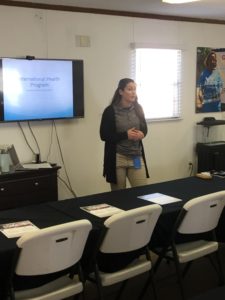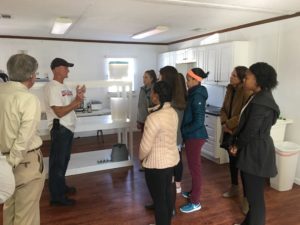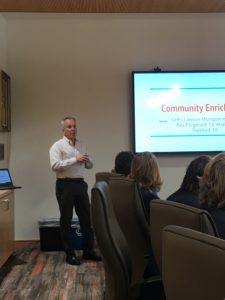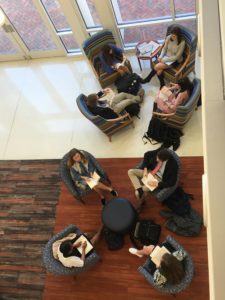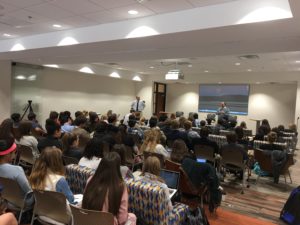Morning Welcome and Team Builder with the 2021s by Anaiya Roberts (2021)
On Thursday, it was the first day of our Fellows Retreat. For the first day, all of the new entrees from the class of 2021, had their own day of initiation. The first activity of the day was supported by a prompt on saving the world from a zombie apocalypse. The entire group of 2021’s was divided into 2 teams of about 8 people of mixed Fellows groups, and we were given a box full of a variety of supplies. We were challenged with building something that would take the “anti zombie pill” and a roll of toilet paper across the “Pit of Misery” (the pool). We were on a clock of about 30 minutes to build the craft and get it across the Pit of Misery without touching it. Once we made it across the Pit of Misery, we then had to wrap a team member in the toilet paper and give them the anti zombie pill. During this activity, we as a group, and myself personally, learned that to be an efficient member of any team or group, you have to work together. That is the only way, and really, the easiest way that things will get done. What worked for our group was coming up with a plan, splitting up into groups, and carrying out the plan. Another key part, is the level of communication within a group. If only one person is talking, your group may be missing out on an idea that may be more efficient and quicker to carry out. Overall, the activity was a success among all of the 21’s, and I can say that it was a fun and exciting way to teach us these lessons.
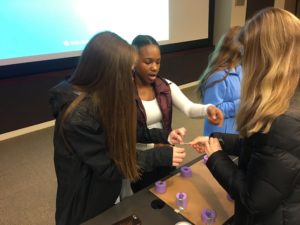
GHF 21s Maddie and Anaiya help their group plan for the attack of the zombies in their team builder with Coach McMahon.
Intro to Global Health Terminology by Erin Clayton (2021):
As we transitioned into the academic portion of our day, the 21s and Mrs. Hall, Mrs.Goodson, and Ms.Nasimiyu gathered in the Catapult Press/Old Fellows room in Batten Library. We began our global health education by watching Hans Rosling’s 200 countries, 200 years, in 4 minutes. We were able to track with the infographic how life expectancy and income were related across countries and their status in the world. Next, we watched an informative video by the Kaiser Family Foundation featuring Kellie Moss. In the video, we learned about some terms including prevalence, incidence, morbidity, mortality, the burden of disease, and DALY, or disease adjusted life expectancy. These terms are important as we discuss global health in Case Studies and in general conversations. Afterwards, we ate a delicious lunch of TASTE and discussed tips for Saturday’s case study on Obesity in Mexico.
Reflections on our Trip to Operation Blessing International by Ella Davis (2021)
As we piled into two cars prepared for our first field trip, our groups worked on individual “elevator pitches” during the 40 minute drive. While heading down just above North Carolina, there were many long discussions about the elevator pitches and how to describe what the Global Health Fellowship is. After a fun-filled journey, we arrived at the Operation Blessing Mosquito Lab where we were greeted by Holly Beistline. She showed us into a conference room and introduced many issues related to global health. In Kenya, there are problems involving childbirth for women in villages with no technology and the nearest health clinic a 4 hours walk away.
Holly told us about her experience with a woman named Naomi who had preeclampsia during labor. Her limbs were swollen, however the Community Health Worker (CHW) who was trained by Operation Blessing was able to refer her to go to a health clinic (instead of eating goat fat) where she was able to successfully give birth to twins. Without the assistance of the CHW and Operation Blessing, the death of Naomi and her twins was very likely, and it showed us the developing countries’ daily struggles to survive without resources we take for granted here in the U.S.
After that impacting presentation, we were introduced to the dangers of mosquitoes who carry Zika. We were taught that mosquitoes carrying Zika are able to penetrate a pregnant woman’s placenta, giving the disease the ability to deform the child. There was a huge breakout in Brazil, and Operation Blessing has spent the past years coming up with ways to reduce the amounts of mosquitoes in places such as Brazil and Haiti. We learned that they raise turtles to eat the mosquito larvae while they are growing in the water. It was really interesting being able to see the tiny little larva under a microscope. We then concluded our trip with a few closing statements, and it was all in all a fantastic way to start our journey with the Global Health Fellows.
